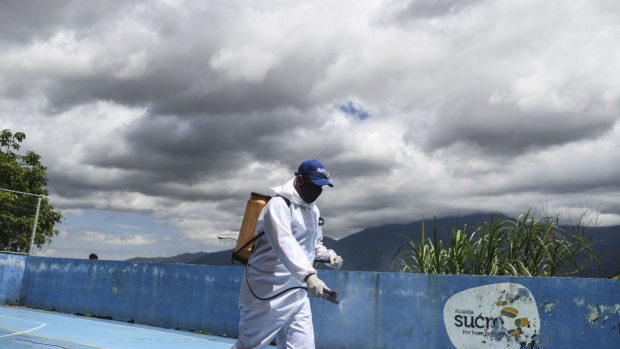Jan 21, 2021
Venezuela’s Access to Vaccines Imperiled By Seized Virus Tests
, Bloomberg News

(Bloomberg) -- A dispute between the Venezuelan government and the opposition over Covid-19 antigen tests that were sent by the Pan American Health Organization is threatening to also narrow access to much-needed vaccines for the crisis-torn country.
The terms of a rare deal last June between President Nicolas Maduro’s administration and opposition leader Juan Guaido to use offshore funds frozen by U.S. sanctions to purchase antigen tests for distribution widely within Venezuelan hospitals were not kept, according to people with direct knowledge of the matter.
Upon arrival in Venezuela in late October, the government took total control of the tests and has barely distributed them, the people said, going against both the opposition agreement and guidelines from PAHO, the regional health body.
Since 340,000 antigen tests arrived in Venezuela in late October, only around 3,000 have been used, or about 1%, according to PAHO.
As Venezuela falls behind the world in beginning to vaccinate its health workers and most frail, PAHO is negotiating avenues to source shots via a fund, since the deadline to access the World Health Organization’s Covax facility has now passed, Ciro Ugarte, emergency director of the Washington-based organization said in a press conference on Jan. 19. But the precedent with the tests and accumulated debts with PAHO of around $11 million make that option impossible at the moment, the people said.
Venezuela’s Information Ministry didn’t respond to requests for comment.
Maduro, for his part, may not see the need to work with PAHO or the WHO to source vaccinations. His government announced an agreement with Russia’s Gamaleya Institute to buy some 10 million Sputnik-V shots which are expected to arrive in the first three months of the year. Close ally Cuba will also run trials for its own vaccine in Venezuela.
With just 121,691 cases and 1,122 deaths from coronavirus, Venezuela -- a country of about 27 million people -- has either been lucky to dodge greater spread due to its relative isolation and government-imposed lockdowns or is not accurately tracking and reporting the disease.
Next door in Colombia, with a population of 49 million people, nearly 2 million cases have been recorded with almost 50,000 deaths.
Through Jan. 7, only about 485,000 PCR tests had been carried out since the first coronavirus case was reported in March, according to a document from the Health Ministry seen by Bloomberg. That’s a rate of just 17 tests per 1,000 people -- one of the lowest reported testing rates in South America. Bolivia, also low on the list, has done 37 tests per 1,000.
Despite government claims of having a robust testing program, official and public reports show that January is on track to be the lowest month of testing since the first case was detected in March. At the same time, daily cases are rising to the highest levels since October.
“The government failed to protect the population by not administering tests that would have timely identified virus carriers and prevented new infections,” said doctor and former health minister Felix Oletta.
©2021 Bloomberg L.P.







